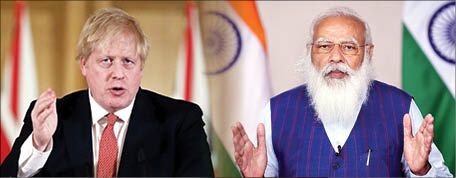Exploring new dimensions
The virtual meet between both PMs offer a window for agreements on defence, climate change, migration and health amidst emerging challenges

India's relation with the United Kingdom is steeped in history, and over the past two decades in the contemporary settings, it grew to acquire contours that are now characterised as transformational Comprehensive Strategic Partnership.
The virtual Summit meeting on Tuesday between Prime Minister Narendra Modi and his British counterpart Boris Johnson underscored that both sides have decided to embark together on a journey amid an altering international landscape.
The first major change that the UK now finds itself in is that the country is to engage with different countries across continents and arrive at fresh connecting points in the post-Brexit era.
The UK is re-engaging with the world in the backdrop of this major shift and separation from the European Union. The country needs to reconnect with other nations, with trade and investment remaining a top priority in the increasingly interconnected world.
At present, trade between the two countries is worth around GBP 23 billion a year, supporting some five lakh jobs with both Prime Ministers promising to work to double it by the year 2030. Among the takeaways is to start negotiations for a Free Trade Agreement. Hopefully, India strikes the mutually beneficial ground and addresses issues that led to such discussions with other countries continuing, for a prolonged period.
Both India and the UK face a challenge with the latter moving away from the EU and now seeking to join the Comprehensive and Progressive Agreement for Trans-Pacific Partnership with outreach to some 500 million people residing in Southeast Asia, Australia, New Zealand and Chile to name a few.
The Summit offered both sides an opportunity to commit to enhancing ties in defence, climate change, workforce exchanges and health, which acquires great significance as the world battles with the pandemic.
Health cooperation
Having come out of a serious wave of COVID-19, the UK is gradually opening up the country for its citizens. Among its major contributions has been the development of the AstraZeneca vaccine, manufactured in India by the Serum Institute as Covishield which is an integral part of the inoculation programme in India.
Given the scale of the pandemic, and with the scientific community cautioning that it is neither the first nor the last, India and the UK agreed that global cooperation and solidarity is imperative for countries to come out of it and move on the path of recovery.
Among the lessons from the current pandemic that the world has learnt is to develop dependable and resilient global supply chains rather than just depending on China, as the case was before the virus put the world under a lockdown last year.
Tackling climate change
Just as discussions in the world capitals revolve around the pandemic and to prepare a new world order, one topic that continues to dominate is climate change. Now that the United States under President Joe Biden reaffirmed Washington's commitment to the Paris Agreement, India will play a major role as the world seeks a solution.
The UK, working its way to carve a place for itself among the leadership, views New Delhi as an important actor to make a change. In this context, both India and the UK have decided to work through a new partnership on renewables and power including offshore wind, energy efficiency and joint launch of a new global Green Grids Initiative at the COP26 for countries to work together on interconnected grids for renewable energy and help deliver on India's vision of 'One Sun, One World, One Grid'.
Strategic and defence cooperation
Earlier this year, the UK announced its approach to the Indo-Pacific and at the meeting, both Prime Ministers affirmed the known formulation.
The policy document was part of the integrated review of foreign, defence, development and security, published last month. The document views the region as the one that is increasingly becoming the geopolitical centre of the world. Flowing from it is the decision to send the UK's Carrier Strike Group led by HMS Queen Elizabeth that will sail to India this autumn. India and the UK would also hold joint exercises that will deepen cooperation in the region.
For India, taking forward its 'Atmanirbhar' campaign, it was decided to collaborate on key military technologies including India's Light Combat Aircraft Mark-2, maritime propulsion system and complex weapons.
An agreement between Hindustan Aeronautics Limited and Rolls Royce envisages moving some aspects of the manufacture of the MT30 engine that is employed by navies around the world and is the basis of the Integrated Electric Propulsion system that provides power to Queen Elizabeth Class Carriers.
By extending an invitation to the UK to place a Liaison Office at India's Information Fusion Centre at Gurugram, New Delhi expands the number of countries that collaborate in monitoring white shipping.
One of the key takeaways is the agreement on Migration and Mobility Partnership facilitating the legal movement of students and professionals and combating illegal migration and organised immigration crime. Through this, some 3,000 young Indian professionals can live and work in the UK, making India the first country whose nationals require a visa to visit the country.
Views expressed are personal



